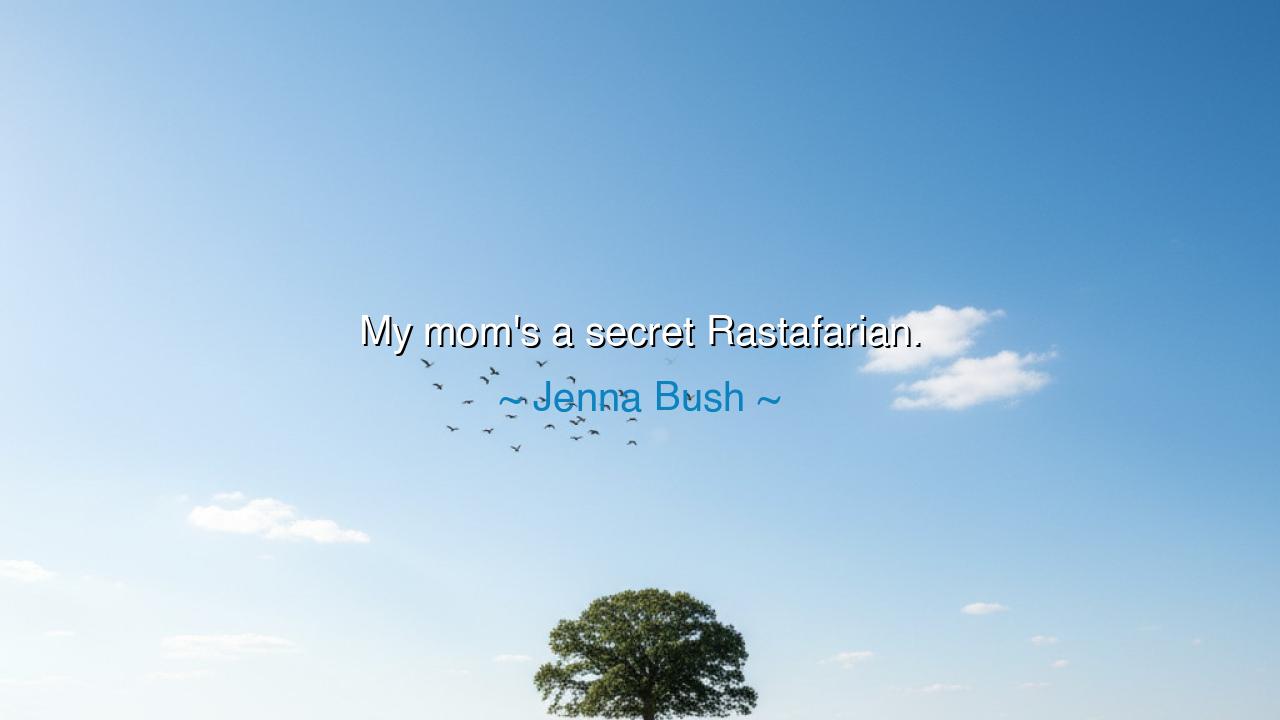
My mom's a secret Rastafarian.






In the playful yet profound words of Jenna Bush, daughter of a president and bearer of her own light, we find a phrase that seems at first to be merely humorous: “My mom’s a secret Rastafarian.” But as with all utterances born of both affection and jest, there lies within it a deeper wisdom — one that speaks of freedom, spirit, and the unseen dimensions of those we think we know best. This sentence, brief as laughter, holds an ancient truth: that every human being carries within them a world unseen, a rhythm that cannot always be measured by the eyes of others.
The origin of this quote lies in a moment of candid humor from Jenna Bush, speaking of her mother, Laura Bush — a woman known for her calm dignity, her grace, and her quiet strength. To call her a “secret Rastafarian” is to recognize something surprising beneath that composed exterior — a hint of rebellion, of joy, of music in the soul. It is a way of saying: My mother, though gentle in appearance, has fire in her spirit. Such words, though light in tone, echo a timeless truth: that the heart of a person is rarely what the world assumes it to be. The outward image is but a mask; the inner life dances to its own rhythm, often unseen, often misunderstood.
The ancients themselves would have smiled at this wisdom. For in the myths of Greece, Aphrodite, goddess of beauty, was not merely delicate charm, but also the force of wild creation. In Egypt, the goddess Isis, mother and healer, also held the power to summon storms. So too does every human — and especially every woman who has walked through the trials of love, family, and duty — carry within her both calm and flame, serenity and song. To call one’s mother a “secret Rastafarian” is to honor the part of her that sings in private, the part that listens to the drumbeat of the universe when no one else is watching.
The Rastafarian spirit itself embodies a kind of ancient simplicity — a reverence for peace, for nature, for the divine spark within every living being. It is a movement born from struggle and faith, from the belief that freedom begins within the mind. To imagine Laura Bush, the poised First Lady, as a secret follower of that joyful rhythm is to glimpse the universal truth that even the most restrained among us crave liberation — that within the most structured life lies the desire for spiritual openness, for laughter, for rhythm. Rastafarianism, in this sense, becomes a symbol — not of religion alone, but of release, of communion with one’s truest self.
History has often shown us that the greatest strength is often hidden beneath gentleness. Consider Mahatma Gandhi, whose soft voice and slender frame concealed an iron will capable of moving empires. Or Queen Esther, who in silence and wisdom delivered her people from destruction. They, too, might be called “secret revolutionaries,” for their power was not loud, but steady — not visible, but unyielding. Likewise, Jenna Bush’s words suggest that even in the quietest hearts, there can live the spirit of rebellion, the music of freedom, and the courage to smile against convention.
Yet, beyond humor and symbol, this quote reminds us of something tender and universal: that our parents — those who raise us, guide us, and seem to stand as pillars of certainty — are more complex, more human, and more alive than we often realize. The child sees the mother as constant, unchanging; but the grown child begins to see the truth — that beneath the mother’s composure lives a dreamer, a thinker, a believer, a hidden soul who once danced to her own rhythm before life’s responsibilities reshaped her days. To call one’s mother a “secret Rastafarian” is, in the language of love, to say, I see you not only as my mother, but as a woman — wild, free, and beautifully human.
The lesson, then, is one of recognition. Look with new eyes upon those you think you already know — your parents, your friends, even yourself. Beneath every calm exterior lies a universe of light and shadow, of yearning and grace. Celebrate that hidden rhythm. If your mother is a “secret Rastafarian,” rejoice in it. If you yourself hide a secret song — a passion, a belief, a dream — let it live. Do not bury it beneath the expectations of the world. The divine does not dwell in appearances, but in authenticity.
So let us honor the spirit that Jenna Bush’s words awaken — the reminder that every soul, no matter how composed, carries within it a rhythm of its own. Let us live not as statues of propriety, but as living songs of joy and depth. Let us see the hidden music in others — and perhaps, one day, let our own hidden music be heard. For in the end, to live with love, humor, and truth is to be, in our own way, a secret Rastafarian — one who moves through life with the quiet fire of freedom burning beneath the calm surface of the everyday.






AAdministratorAdministrator
Welcome, honored guests. Please leave a comment, we will respond soon